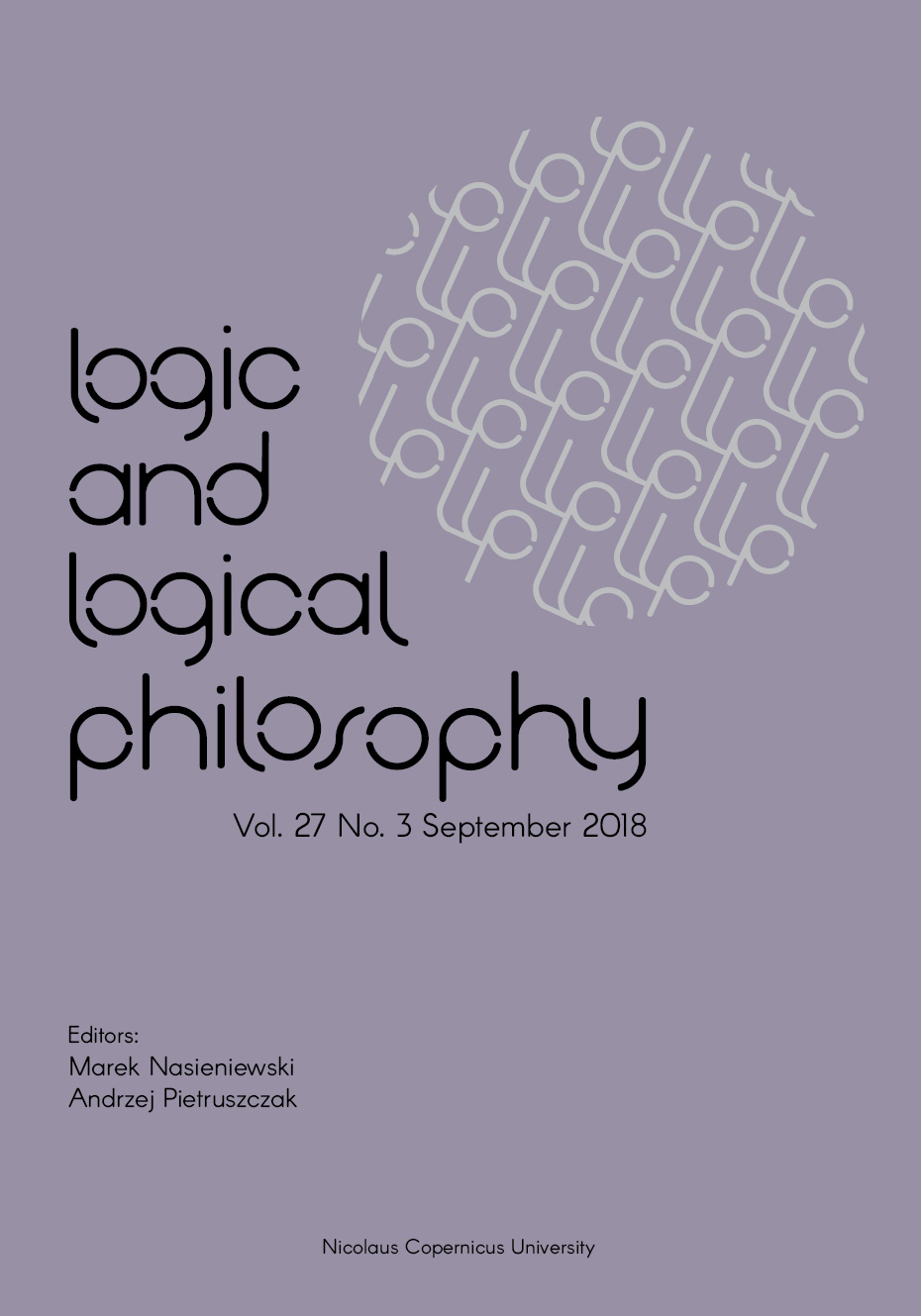All Properties are Divine or God Exists - The Sacred Thesis and its Ontological Argument
DOI:
https://doi.org/10.12775/LLP.2017.027Keywords
modal logic, ontological argument, Gödel, higher order logic, philosophy of religion, theologyAbstract
A metaphysical system engendered by a third order quantified modal logic S5 plus impredicative comprehension principles is used to isolate a third order predicate D, and by being able to impredicatively take a second order predicate G to hold of an individual just if the individual necessarily has all second order properties which are D we in Section 2 derive the thesis (40) that all properties are D or some individual is G. In Section 3 theorems 1 to 3 suggest a sufficient kinship to Gödelian ontological arguments so as to think of thesis (40) in terms of divine property and Godly being; divine replaces positive with Gödel and others. Thesis (40), the sacred thesis, supports the ontological argument that God exists because some property is not divine. In Section 4 a fixed point analysis is used as diagnosis so that atheists may settle for the minimal fixed point. Theorem 3 shows it consistent to postulate theistic fixed points, and a monotheistic result follows if one assumes theism and that it is divine to be identical with a deity. Theorem 4 (the Monotheorem) states that if Gg and it is divine to be identical with g, then necessarily all objects which are G are identical with g. The impredicative origin of D suggests weakened Gaunilo-like objections that offer related theses for other second order properties and their associated diverse presumptive individual bearers. Nevertheless, in the last section we finesse these Gaunilo-like objections by adopting what we call an apathiatheistic opinion which suggest that the best concepts `God’ allow thorough indifference as to whether God exists or not.
References
C.A. Anderson, “Some emendations of Gödel’s ontological argument”, Faith and Philosophy VII, 3 (1990): 291–303.
F.A. Bjørdal, “Understanding Gödel’s ontological argument”, pages 214–217 in T. Childers (ed.), The Logica Yearbook 1998, Filosofia, Prague, 1999.
F.A. Bjørdal: “The evaluation semantics: A short introduction”, pages 31–36 in M. Pelis and V. Puncochar (eds.), The Logica Yearbook 2011, College Publication 2012.
F.A. Bjørdal, “Elements of librationism”, at the arXiv:1407.3877.
F.A. Bjørdal, “Librationist closures of the paradoxes”, in Logic and Logical Philosophy 21, 4 (2012): 323–361. DOI: 10.12775/LLP.2012.016
F.A. Bjørdal, “Should the world be there?”, forthcoming in R. Silvestre, J.-Y. Béziau, B.P. Göcke, and P. Bilimoria (eds.), Beyond Faith and Rationality: Essays on Logic, Religion and Philosophy, to appear in the Springer Book Series “Sophia Studies in Cross-cultural Philosophy of Traditions and Cultures”.
F.A. Bjørdal, “On the reality of the future”, talk at the event “Entering the Third Millennium – Philosophy between its Past and its Future” at Universitetet of Bergen, Norway, May 2000.
A. Bressan: A General Interpreted modal Calculus, Yale University Press 1972.
M. Cresswell: “Rudolf Carnap: Modal logic”, The Internet Encyclopedia of Philosophy, April 17 2017. http://www.iep.utm.edu/
H.B. Enderton, “Second-order and higher-order logic”, The Stanford Encyclopedia of Philosophy (Fall 2015 Edition), Edward N. Zalta (ed.). https://plato.stanford.edu/archives/fall2015/entries/logic-higher-order/
S. Feferman, “Predicativity”, pages 590–624 in S. Shapiro (ed.), The Oxford Handbook of the Philosophy of Mathematics and Logic, Oxford University Press 2005. DOI: 10.1093/0195148770.003.0019
M. Fitting: Types, Tableaus and Gödel’s God, Vol. 12 of “Trends in Logic”, Springer 2002. DOI: 10.1007/978-94-010-0411-4
A. Fuhrmann, “Existenz und Notwendigkeit: Kurt Gödels axiomatische Theologie”, pages 349-374 in W. Spohn (ed.), Logik in der Philosophie, Synchron, Heidelberg 2005.
D. Gallin, Intensional and Higher-Order Modal Logic, North-Holland 1975.
K. Gödel, “Ontological proof”, pages 403–404 in S. Feferman et al. (eds.), Kurt Gödel: Collected Works, Vol. III of Unpublished Essays and Lectures, Oxford University Press 1995.
P. Hájek, “Magari and others on Gödel’s ontological proof”, pages 125–136 in A. Ursini et al. (eds.), Logic and Algebra, Marcel Dekker 1996.
P. Hájek, “Der Mathematiker und die Frage der Existenz Gottes”, pages 325-336 in B. Buldt et al. (eds.), Wahrheit und Beweisbarkeit, Vol. II of Kurt Gödel. Kompendium zum Werk, ÖBV & HPT 2002.
L. Henkin: “Completeness in the theory of types”, The Journal of Symbolic Logic 15, 2 (1950): 81–91. DOI: 10.2307/2266967
S.A. Kripke, “Semantical considerations on modal logic”, Acta Philosophica Fennica 16 (1963): 83–94. DOI: 10.1007/978-3-0346-0145-0_16
B. Linsky and E. Zalta, “In defense of the simplest quantified modal logic”, pages 431–458 in J. Tomberlin (ed.), Philosophical Perspectives 8: Logic and Language, Atascadero: Ridgeview, 1994. DOI: 10.2307/2214181
R. Magari, “Logica e teofilia”, Notizie di Logica VII, 4 (1988): 11–20.
R. Montague, “Syntactical treatments of modality, with corollaries on reflexion principles and finite axiomatizability”, Acta Philosophica Fennica 16 (1963): 153–167.
R. Montague, “English as a formal language”, pages 189-224 in B. Visenti et al. (eds), Linguaggi nella Societa e nella Tecnica, Edizioni di Counita: Milan 1970. Reprinted in [29].
R. Montague, “Universal grammar”, Theoria 36 (1970): 373–398. Reprinted in [29]. DOI: 10.1111/j.1755-2567.1970.tb00434.x
R. Montague, The proper treatment of quantification in ordinary English, pages 221-242 in J. Hintikka, J. Moravcsik, and P. Suppes (eds.), Approaches to Natural Language, Reidel, Dordrecht, 1973. Reprinted in [29]. DOI: 10.1007/978-94-010-2506-5_10
R. Muskens, “Higher order modal logic”, pages 621–653 in P. Blacburn et al. (eds.) Handbook of Modal Logic, Elsevier 2006. DOI: 10.1016/S1570-2464(07)80013-9
G. Oppy, “Gödelian ontological arguments”, Analysis 56, 4 (1996): 226–230. DOI: 10.1093/analys/56.4.226
J.H. Sobel, “Gödel’s ontological proof”, pages 241-261 in J.J. Thomson (ed.), On Being and Saying, MIT Press 1987.
R. Thomason (ed), Formal Philosophy, Selected papers of Richard Montague, Yale University Press 1974.
T. Williamson, Modal Logic as Metaphysics, Oxford University Press 2013. DOI: 10.1093/acprof:oso/9780199552078.001.0001
T. Williamson, “Bare possibilia”, Erkenntnis 48 (1998): 257–273.
Downloads
Published
How to Cite
Issue
Section
Stats
Number of views and downloads: 973
Number of citations: 0







